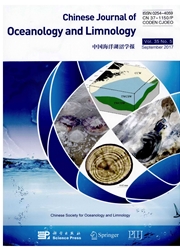

 中文摘要:
中文摘要:
水产业生产效率可以由使用增加喂添加剂。这研究调查了不同饮食的添加剂的效果[w/w:2% 小肽, 0.01% probiotics (杆菌 licheniformis ) 和 0.2% prebiotics (菊粉)] 在在少年 Epinephelus 的生长性能,消化的酶活动,和氧化应力上, coioides 在二盐集中(13.5 对 28.5 ) 的人工的海水高耸了。重量获得率在喂的鱼是显著地更高的与小肽补充的食谱, B。在鱼的比那的 licheniformis,菊粉,或 synbiotics 喂了基础食谱;最大的重量获得率在喂的鱼被发现小肽处理[56.0% 比基础饮食高] 。更高喂效率在喂的鱼被检测在另外的饮食的处理比鱼的与小肽补充的食谱。在胃和肠的全部的朊酶活动在鱼是最高的喂了小对待肽的食谱,而脂肪分解酵素活动在喂的鱼比那在那些喂的 synbiotics (杆菌 licheniformis 和菊粉的联合) 是最高的另外的处理。活动和肝的 malondialdehyde 满足的抗氧化剂酶(全部的 superoxide dismutase 和过氧化氢酶) 在收到饮食的补充的鱼是更高的并且在在控制(28.5 ) 与那些相比包含 13.5 咸度的人工的海水维持了。在 grouper 的肝的过氧化氢酶活动用小肽喂了食谱或 synbiotics 在控制鱼与那相比显著地减少了。总的来说,添加剂的三种类型改进了少年 grouper 和消化的酶活动的生长率到改变度但是有效地没在低咸度的压力条件下面改进抗氧化剂能力。
 英文摘要:
英文摘要:
Aquaculture production efficiency may increase by using feed additives. This study investigated the effects of different dietary additives [w/w: 2% small peptides, 0.01% probiotics( Bacillus licheniformis) and 0.2% prebiotics(inulin)] on growth performance, digestive enzyme activities, and oxidative stress in juvenile Epinephelus coioides reared in artificial seawater of two salt concentrations(13.5 vs. 28.5). Weight gain rate was significantly higher in fish fed the diet supplemented with small peptides, B. licheniformis, inulin, or synbiotics than that in fish fed the basal diet; the greatest weight gain rate was found in fish fed the small peptide treatment [56.0% higher than basal diet]. Higher feed efficiency was detected in fish fed the diet supplemented with small peptides than that of fish in the other dietary treatments. Total protease activity in the stomach and intestines was highest in fish fed the small peptide-treated diet, whereas lipase activity was highest in those fed synbiotics(combination of Bacillus licheniformis and inulin) than that in fish fed the other treatments. Antioxidant enzyme(total superoxide dismutase and catalase) activities and hepatic malondialdehyde content were higher in fish receiving the dietary supplements and maintained in artificial seawater containing 13.5 salinity compared with those in the control(28.5). Hepatic catalase activity in grouper fed the diets with small peptides or synbiotics decreased significantly compared with that in control fish. Overall, the three types of additives improved growth rate of juvenile grouper and digestive enzymes activities to varying degrees but did not effectively improve antioxidant capacity under low-salinity stress conditions.
 同期刊论文项目
同期刊论文项目
 同项目期刊论文
同项目期刊论文
 期刊信息
期刊信息
